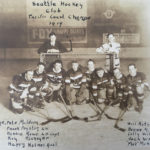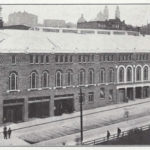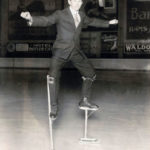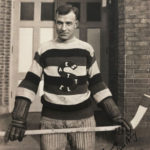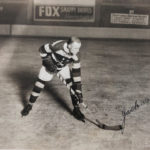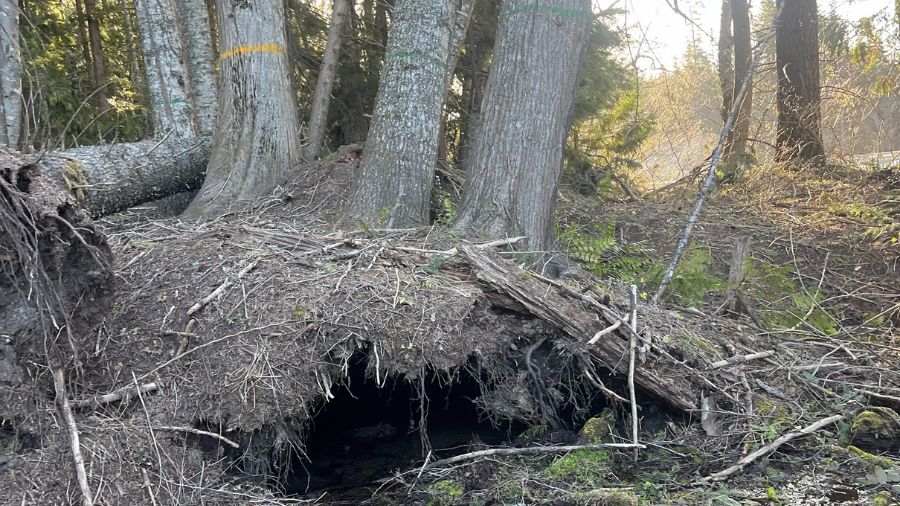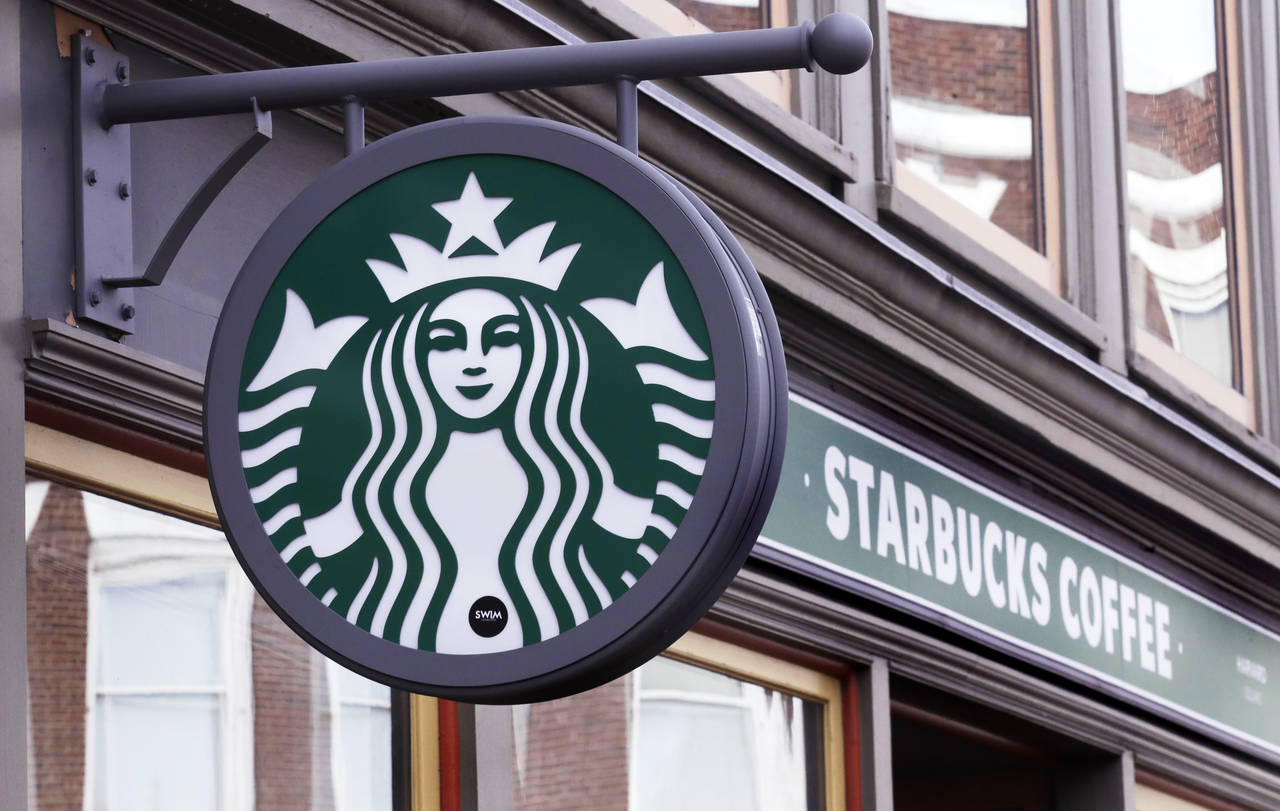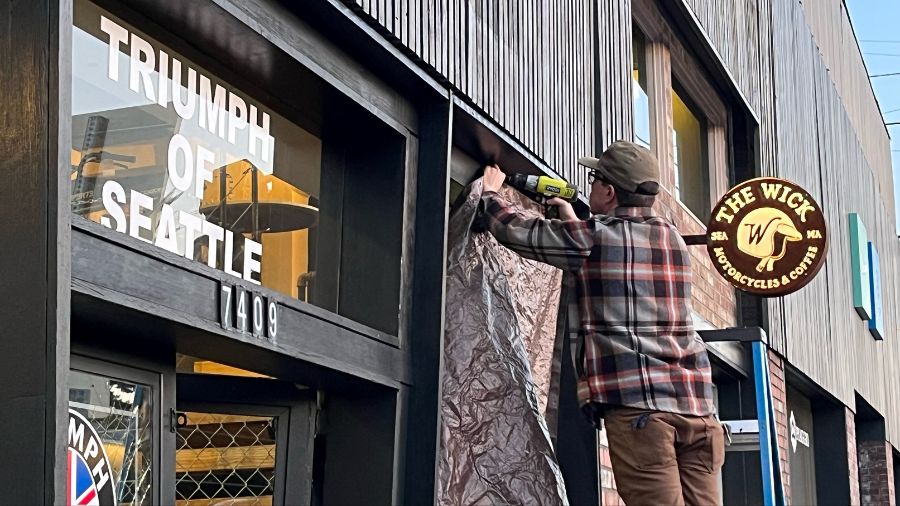Seattle’s ill-fated Stanley Cup run of 1919
Apr 3, 2019, 6:08 AM | Updated: 10:41 am
With an NHL franchise set to begin playing at what’s now KeyArena in 2021, there’s been a lot of looking back at the storied 1917 Stanley Cup victory of the Seattle Metropolitans hockey team.
RELATED: Who named the Seattle Mariners?
Sometimes lost in those commemorations of that long-ago championship is the sad fate of the 1919 edition of Seattle’s red, white and green-striped skating and shooting phenoms. But if one local former athlete – and newly minted author — has his way, that 1919 team will be remembered forever, too, and one of its forgotten players will finally get inducted into the Hockey Hall of Fame.
“A hundred years ago this week, the 1919 Stanley Cup Finals were played between the Seattle Metropolitans and the Montreal Canadiens,” said Kevin Ticen a few days ago, as he stood near the corner of Fifth Avenue and University Street on the edge of downtown Seattle.
Why Fifth and University?
That was where the Seattle Ice Arena opened for business in 1915, and where it stood until 1924 when it was torn down to make way for a parking garage for the old Olympic Hotel. That structure was replaced by the IBM Building in the 1960s.
Ticen was a baseball player at the University of Washington. He played on two teams in 1997 and 1998 that won the Pac-10 Championship, and was captain of the team in 1999. He also played in the Anaheim Angels minor league system, and then was a coach at the University of Washington from 2005 to 2010.
He only became aware of Seattle’s 1917 hockey championship just before the centennial a few years ago, when he was working for the Seattle Sports Commission.
“I was asked to help with the 1917 celebration, and I didn’t know anything about it,” Ticen said. “[I was] born and raised in Seattle, and was an athlete at the UW, and it sort of bothered me that I didn’t know anything about it.”
A book about Seattle hockey
It bothered him so much, he decided that somebody needed to write a book. That somebody, it turned out, would be Kevin Ticen.
“I pitched a few authors that I knew to write the story, [but] no one responded,” Ticen said. “If you win a championship, you deserve to be known and have your story told.”
Ticen’s book, “When It Mattered Most: The Forgotten Story of America’s First Stanley Cup and The War to End All Wars,” is out just in time to mark the centennial of the ill-fated 1919 Stanley Cup playoffs that were held in Seattle.
In 1918, one year after Seattle’s Stanley Cup championship, the Pacific Coast Hockey Association had shrunk to just three teams because of the United States entering the First World War. That year, National Hockey League champion Toronto beat Pacific Coast Hockey champion Vancouver in Toronto for the Stanley Cup. Then, in 1919, with the war over, Seattle and Montreal won their respective leagues, and the two teams earned the right to play a rematch in Seattle of 1917.
Seattle won the first game of the series on Wednesday, March 19, 1919 by a dominating score of 7-0. Game Two went to the Canadiens 4-2 on Saturday, March 22. Game Three, on Monday, March 24, was a Mets victory, 7-2.
What came next, with Seattle leading the series 2-1, says Ticen, was one for the history books.
“The fourth game is considered the greatest hockey game ever played,” said Ticen. “It’s a 0-0 tie through [three regular periods] and two overtime periods.”
Beyond being a tie, what else made Game Four on Wednesday, March 26, 1919 so historically great?
“It was a fast game, it was an athletic game,” Ticen said. “It was two teams going toe-to-toe through three full periods and two overtimes, and no one could get a goal across. It wasn’t a slog, or an ugly game, or anything like that. It was a beautifully fast, athletic game.”
Defensively speaking, says Ticen, the goalies were extraordinary, and extraordinarily well-matched.
“Two of the best goalies to ever play the game are competing,” said Ticen. “Georges Vezina is the Canadiens goalie, and the top goalie trophy in the NHL is still named after him. And Hap Holmes is Seattle’s goalie. They’re both Hall of Famers. The American Hockey League, which is the minor league in the East . . . their top goalie award is named after Hap.”
Effects of the Spanish Flu pandemic
But, says Ticen, though Game Four was an incredible showdown, it was also when the effects of the Spanish Flu pandemic became an even bigger factor than talent, skill or even luck.
“The flu is starting to take root with some of the players, so [some of] the players begin to collapse at the end of the game,” Ticen said. “And the referee calls it, and declares it a draw.”
Game Five goes on as scheduled on Saturday, March 29, and The Metropolitans go up 3-0 in the third period. But the Canadiens rally to tie the game, and then win it in overtime 4-3, tying the series 2-2-1.
Ticen says The Metropolitans’ loss in Game Five came down to several factors.
“Frank Foyston, who’s the Mets’ star player, gets injured and has to be carried off the ice,” Ticen said. “Jack Walker, who’s also a Hall of Famer, breaks a skate and has to come off the ice while they fix it. At the same moment, Cully Wilson, who’s also one of the star players, collapses from exhaustion.”
“At the moment [Cully Wilson] collapses … the Canadiens manager sends a reserve onto the ice, and they take advantage of the six-on-four [mismatch] … and they score the game-winning goal.”
In addition to the injuries, equipment failure and fatigue, Ticen says The Metropolitans were at a distinct disadvantage for the entire 1919 Stanley Cup series because of the absence of one of their best players.
“Bernie Morris, who’s The Metropolitans’ leading scorer, is sitting in a jail cell at Fort Lewis awaiting trial for draft evasion from the US military, despite being a Canadian citizen,” Ticen said. “And so The Metropolitans have one less player than they’re used to.”
Final games
But this was no ordinary Stanley Cup series. And the finish would be no exception.
“The final game was set for [Tuesday,] April 1, and the morning after Game Five, everybody woke up really sick, and five of the Canadiens end up being hospitalized,” Ticen said, pointing to the Spanish Flu pandemic that ultimately killed millions around the world in 1918 and 1919, and had first hit Seattle during the previous autumn.
Canadiens defenseman “Joe Hall is very, very ill, and he ends up dying from it a week later,” said Ticen. “The Canadiens offer to forfeit the Cup, [because] they’re pretty confident The Metropolitans are going to win the last game [because] The Metropolitans have outscored the Canadiens by almost 10 goals in the series.”
But these were different times, says Kevin Ticen.
“The Metropolitan leadership and Frank Patrick, the president of the [Pacific Coast Hockey Association], will not accept the trophy,” Ticen said. “They feel like if they didn’t win it on the ice, then they’re not going to do it. The Canadiens offer to bring in amateur players to fill out their roster [for Game Six] so that The Metropolitans can win the Cup, [but] the Metropolitans, again, will not accept it.”
Thus, for the first and only time in its history, two teams played for the Stanley Cup, and neither team won it.
“The two leagues [the Pacific Coast Hockey Association and the National Hockey League] agree to call it a draw,” Ticen said.
In 1920, Seattle again competed for the Stanley Cup, losing to the Ottawa Senators in five games in Ottawa. By 1924, the Pacific Coast Hockey Association was out of business, and Seattle was without a hockey team, or a venue for hockey, until the Civic Arena was built in 1928.
The spirit – and level of success – of The Metropolitans would never be matched in the subsequent decades, or nearly a century, really, of minor league hockey in Seattle and around Puget Sound.
Heroes in Seattle
Even so, The Metropolitans players would remain local heroes for the next several decades, though most were originally from Toronto.
“They were a Seattle team,” said Ticen. “They’re all Canadian citizens, but they all ended up marrying people from Seattle, and staying here, and raising their kids here.”
Ticen says it was almost always front-page news in the 1950s and early 1960s when former Metropolitans passed away because the team was so fondly remembered, and because many of the men either never left, or because they returned here when their playing days were over.
“Frank Foyston and Bernie Morris had adjoining turkey farms in Port Orchard, Cully Wilson lived in North Seattle, Jack Walker lived in Beaux Arts over in Bellevue,” Ticen said. “[Star defenseman] Bobby Rowe lived in Portland.”
In addition to telling the story of the 1917 and 1919 Seattle Metropolitans, Ticen would like to see Bernie Morris, who sat out the 1919 Stanley Cup wrongfully jailed, get the credit Ticen believes he deserves.
A nod to Bernie Morris
“Bernie Morris is the center on the team, and I really enjoyed getting to know him” through research for his book, said Ticen. “He’s orphaned at the age of eight, he’s sort of the tragic figure of the team. If anything can go wrong in his life, it will.”
Ticen says Morris was injured in 1914, and Metropolitans’ coach Pete Muldoon “picked him up off the scrap heap.” Then, Ticen says, “he leads the league in goals scored that first year, and then the next year, sets the league scoring record.”
“He’s a great player, and he should be a Hall of Famer,” Ticen said. “I’m sort of hopeful that as we really get this story out more, that [Bernie Morris] has a chance to get inducted.”
If there’s any better way to kickoff the NHL era in Seattle in 2021 than by inducting The Metropolitans’ long-deserving star player Bernie Morris into the Hockey Hall of Fame, I sure can’t think of one.


